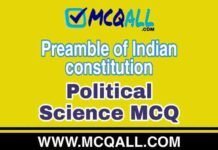Indian Polity – Political Science MCQ Question and Answer
Indian Polity – Political Science MCQ Question and Answer : Indian Polity – Political Science MCQ Question and Answer is given below. This Indian Polity – Political Science MCQ / Indian Polity – Political Science Quiz / Indian Polity – Political Science Question and Answer / Indian Polity – Political Science Multiple Choice Question, Short Question, Question and Answer, Suggestion, Notes are very important for school, college and various competitive or job exams and interviews.
Those of you who are looking for Indian Polity – Political Science MCQ Question and Answer, can read the questions and answers given below.
Indian Polity – Political Science MCQ
- Which one is the most prominent element of a state?
(A) Flag
(B) Capital
(C) Sovereignty
(D) Head of State
Answer : Sovereignty
Solution: The state has four essential elements: Population, Territory, Government and Sovereignty. Among all of them, Sovereignty is the most important element. India, before 1947 was not a state because though it had the other three elements, i.e., population, territory and government, the fourth and the most important one, i.e., Sovereignty was missing (because of British control over India).
- The Constitution of India recognizes –
(A) Only religious minorities
(B) Only linguistic minorities
(C) Religious and linguistic minorities
(D) Religious, linguistic and ethnic minorities
Answer : Religious and linguistic minorities
Solution: The Constitution of India recognizes both religious and linguistic minorities. According to Article 29, citizens residing in the territory of India having a distinct language, script, or culture of its own shall have right to conserve the same. Article 30 provides minorities right to establish and administer educational institution whether based on religion or language.
- The President
(A) is not a part of the Parliament
(B) is a part of the Parliament
(C) is not a part of the Parliament and sits in the Parliament
(D) can vote in the Parliament
Answer : is a part of the Parliament
Solution: Under the Constitution, the Parliament of India consists of three parts viz, the President, the Council of States and the House of the People .
Though the President of India is not a member of either House of Parliament and does not sit in the Parliament to attend its meetings, he is an integral part of the Parliament.
- Which of the following statements is not true regarding the Parliament of India.
(A) The Constitution provides for a Parliamentary form of Government.
(B) The function of the Parliament is to provide for a Cabinet.
(C) The membership of the cabinet is restricted to the Lower House.
(D) The cabinet enjoys the confidence of the majority in to the popular chamber of the house.
Answer : The membership of the cabinet is restricted to the Lower House.
Solution: A person who is not a member of either House can also become the member of the Cabinet, but he cannot continue as minister for more than 6 months, unless, he secure a seat in either House of the Parliament i.e. Lok Sabha or Rajya Sabha [According to Article 75(5)].
- C.A.G (Comptroller and Auditor General) of India acts as –
(A) The Guardian of people’s liberties.
(B) The Guardian of Public Finance.
(C) The Chief Legal Ad visor of the Government.
(D) The guardian of all these.
Answer : The Guardian of Public Finance.
Solution: The Comptroller and Auditor General (CAG) of India acts as the Custodian and Trustees of public money, and it is the duty of the CAG to see that even a single penny of the Consolidated Fund of India or of any State should not be spent without proper authorization of the Legislature.
- The provision for the representation of Anglo-Indian Community in the Legislative Assemblies of the States
has been made in the Constitution of India under –
(A) Article 330
(B) Article 331
(C) Article 332
(D) Article 333
Answer : Article 333
Solution: Under Article 333 of the Constitution, it is provided that the Governor of a State may if he is of the opinion that the Anglo Indian community needs representation in the Legislative Assembly and is not adequately represented therein, nominate one member of that community to the Assembly.
- How can the President spend from Contingency Fund ?
(A) In time of natural calamity
(B) After Authorization of Parliament.
(C) Before Authorization of Parliament.
(D) Cannot spend.
Answer : Before Authorization of Parliament.
Solution: The Contingency Fund is established by Parliament by law under Article 267 of the Indian Constitution. This fund is placed at the disposal of the President of India, and no approval of the Parliament is needed while withdrawing the money from the fund. He may make advances out of this fund. It is to be used for the purpose of meeting unforeseen expenditures.
- Which of the following is not a Union Territory ?
(A) The Andaman and Nicobar Islands
(B) Daman and Diu
(C) Goa
(D) Puducherry
Answer : Goa
Solution: The first schedule of the constitution lists the names of the Union territories and the states of India .There are 29 states and 9 UTs. In the given options, Goa is the only state, and all others are UTs.
- Under what provision of the constitution, untouchability has been abolished ?
(A) Article 14
(B) Article 21
(C) Article 17
(D) Article 19
Answer : Article 17
Solution: Art. 17 abolished untouchability and declares that its practice in any form is forbidden and enforcement of any disability arising out of untouchability shall be an offence and punishable by law.
- Which Article of the Constitution of India is related with Freedom of the press ?
(A) Article 19
(B) Article 20
(C) Article 21
(D) Article 22
Answer : Article 19
Solution: In the Indian constitution freedom of the press is not given directly but Supreme Court held that right to freedom of speech and expression (Article 19) include right to freedom of the Press.
Political Science MCQ Question and Answer
See also: – Political Science MCQ Question and Answer Click Here
Indian Polity – Political Science MCQ Question and Answer
Indian Polity – Political Science MCQ Question and Answer: Indian Polity – Political Science MCQ Question and Answer – Indian Polity – Political Science MCQ Question and Answer has been discussed above.
Indian Polity – Political Science Multiple Choice Question and Answer
Indian Polity – Political Science Multiple Choice Question and Answer: Indian Polity – Political Science Multiple Choice Question and Answer – Indian Polity – Political Science Multiple Choice Question and Answer discussed above.
Indian Polity – Political Science Quiz
Indian Polity – Political Science Quiz : Indian Polity – Political Science Quiz – Indian Polity – Political Science Quiz has been discussed above.
Indian Polity – Political Science Question and Answer in English
Indian Polity – Political Science Question and Answer in English: Indian Polity – Political Science Question and Answer in English – Indian Polity – Political Science Question and Answer in English.
Indian Polity – Political Science MCQ Question and Answer
If you benefit from this “Indian Polity – Political Science MCQ Question and Answer” post then our efforts will be successful. Also visit our MCQALL.COM website or follow us on various social networking sites (Telegram, Facebook, Youtube, Instagram, Twitter) to know MCQ – Multiple Choice Question Quiz on various topics, questions and answers quiz from GK and Daily Current Affairs. Thank you.












